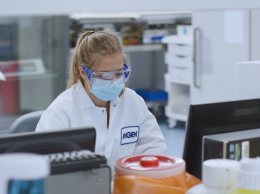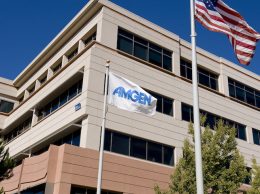
A statue of Amgen co-founder William K. Bowes Jr. stands watch over the Thousand Oaks campus of the biotech giant.
Amgen’s $13.4 billion acquisition of lucrative psoriasis therapy Otezla secures nearly a decade of revenue growth for the biotech giant to bridge the gap between its waning legacy products and potential new contenders.
The relatively small deal could nonetheless change the landscape of the biotech industry, allowing regulators to approve a $74 billion takeover bid of Celgene by Bristol Myers Squibb.
“It’s not often that a company wants to sell a $2 billion (per year) drug that’s growing still,” said Matt Phipps, biotechnology analyst for William Blair. “It’s kind of a unique situation.”
Without the deal, Amgen might have faced revenue declines in coming years. Sales volumes have been on the rise for recently released products in new markets like migraine therapies, but the company has had to balance that against losses among older products, such as calcium reducer Sensipar and white blood cell booster Neulasta, both battling competition from copycat drugs.
The Thousand Oaks company said it expects to see “at least low double digit growth” from Otezla’s $1.6 billion in sales in 2018 that would put 2019 revenue from the product near the $2 billion mark.
Celgene’s divestment of the drug would pave the way for the Federal Trade Commission to approve its takeover by Bristol-Meyers Squibb, which has competing products in its own pipeline.
Bristol-Meyers Squibb said in a news release that Amgen’s Otezla acquisition is contingent on a consent decree with the FTC and the closing of the Celgene deal, which it expects to happen by the end of the year. Amgen shares popped 3 percent immediately after the Aug. 26 announcement and continued to climb, ending at $207.52 at press time.
With the deal, Amgen trades cash on hand for recurring revenue during Otezla’s remaining patent years, which extend through 2028.
That’s a better strategy for the company than focusing spending on stock buybacks and dividend hikes, Phipps said.
The biotech giant ended its most recent quarter with nearly $22 billion in cash, “But so far they’ve really used that for buybacks and R&D deals, but those are early stage,” he said. The deal “balances it out with later-stage assets and something that’s going to bring in some revenue.”
An expected $2.2 billion in immediate tax benefits from the deal puts Amgen’s cash outlay at a little more than $11 billion, the company said.
While he set the value of Otezla closer to $8 billion-$10 billion, Phipps said it plays to Amgen’s strengths, taking advantage of its existing manufacturing and sales infrastructure.
The product occupies a relatively safe position among patients with mild cases and as a frontline therapy for newly diagnosed patients, he said. Amgen’s experience with formula negotiations will help maintain it as a first line option, and even potential releases from Bristol that could offer competition would likely target more severe cases.
“I think that’s where Otezla will really fit and continue to have a really strong position,” Phipps said.
The drug has potential label expansions into moderate or severe scalp conditions and mild to moderate psoriasis, Cowen analyst Yaron Werber said in a note to investors Aug. 26.
Amgen CEO Robert Bradway said the oral psoriasis therapy “fits squarely within” its inflammatory disease and rheumatoid arthritis portfolio, with its top-selling treatment Enbrel and its biosimilar Amgevita, which mimics global best-seller Humira.
The acquisition would appear to take larger deals off the table for Amgen.
Watchers of the stock anticipated a deal after a court decision Aug. 8 that neutralized a biosimilar threat to Enbrel and left the company in a good position for an acquisition.
Mizuho Securities Senior Biotech Analyst Salim Syed said the company has been under pressure from investors to make a deal, including rumors of a potential $45 billion takeover of Connecticut-based Alexion Pharmaceuticals.
The large-scale mergers and acquisitions that were expected in the space in 2018 have begun to materialize now in 2019, but “Amgen’s been the one company that’s sort of been on the sideline with a large cash pile that really hasn’t done much in M&A.”
Mega-mergers like the Bristol-Celgene acquisition can be costly to integrate, Syed said, making bolt-on deals — like the Otezla acquisition — more preferable for Amgen.
Amgen will likely launch the drug in new territories where it has already received approval, Werber said, bolstering the company’s presence in Europe and Japan. He said he expects Amgen to acquire its joint venture with Astellas in Japan in 2020 and continue to invest in marketing Amjevita internationally.
• Contact Marissa Nall at mnall@pacbiztimes.com.






 Print
Print Email
Email

















